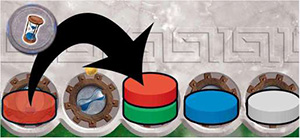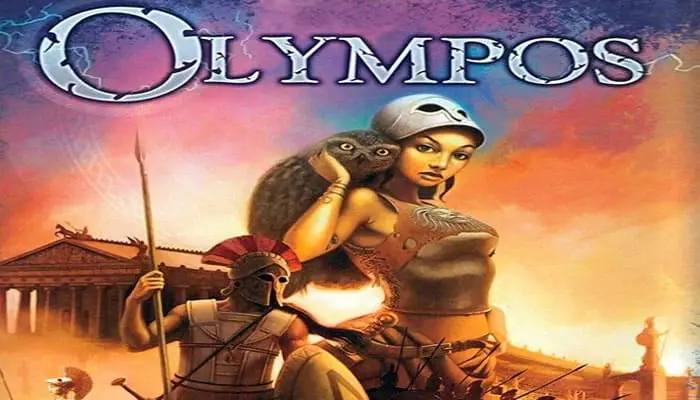
At the dawn of civilization, take the destiny of a whole people into your hands. In front of you, the plains of the Peloponnese stretch out. In the distance, the bright shores of the mythical Atlantis.
However, in order to create a stable environment in this promised land, you will need to defeat your enemies, develop technologies, build wonders, and above all pray for the clemency of the gods who watch your every action from on high in their abode on Olympos!
Components

- 55 "Discovery" tiles
- 5 "Wonder" tiles
- 1 development board
- 32 territory tokens/"Cross"
- 28 "Prestige" tokens
- 12 "Hourglass" to
- 8 "Tribe" tokens/"Star"
- 1 "Zeus" token
- 1 game board
- 10 "Olympos" cards
- 22 "Destiny" cards
- 100 "Settler" tokens
- 28 "Resource" cubes
- Instructions
Setup
(4 players)
Place the game board and the development board in the center of the table. Discard those Discovery tiles with a 5 on the back (they will not be used during the game).
Sort the remaining Discovery tiles by type: for example, the two Oracle tiles go together. There are two of each Discovery with a red, green, yellow or blue back, and one of each with a purple back.
Set up the Discovery tiles on the development board as follows, one pile per column:
- Distribute the 5 piles of 2 red-backed Discovery tiles randomly along the first row of the board.
- Distribute the 5 piles of 2 yellow-backed Discovery tiles randomly along the second row of the board.
- Distribute the 5 piles of 2 green-backed Discovery tiles randomly along the third row of the board.
- Distribute the 5 piles of 2 blue-backed Discovery tiles randomly along the fourth row of the board.
- Distribute the 5 purple-backed Discovery tiles randomly along the fifth row of the board.
- Distribute the 5 Wonder tiles randomly along the sixth row of the board.
Sort out the remaining tokens along with the resource cubes and place them to one side of the board as a general stock.
Each player chooses a color and takes 5 Settler tokens in that color, keeping 4 in front of them as their personal stock. The fifth token is placed on the starting space of the Time Track. The order of these tokens must be determined randomly.
The player whose token is at the bottom of the stack takes 2 Territory tokens of each type from the general stock and selects 8 territories that will not be used in the game, marking each selected territory with one of the tokens, cross side face up. Only one territory of a given type containing a star may be removed in this way.
Note: the number of starred territories that are marked (0 to 4) affects the difficulty of building wonders.
Place one Tribe token on each territory containing a star that hasn't been marked.
Take 4 different resource cubes from the general stock and give one randomly to each player. These are added to the players' personal stocks.
Shuffle the Destiny cards and put them face down next to the board.
Shuffle the Olympos cards and place one face down next to each of the 3 Zeus spaces on the Time Track. Place 2 Olympos cards face down next to each of the 3 Double Zeus spaces on the Time Track. Discard the remaining Olympos card without looking at it: it will not be used during the game.
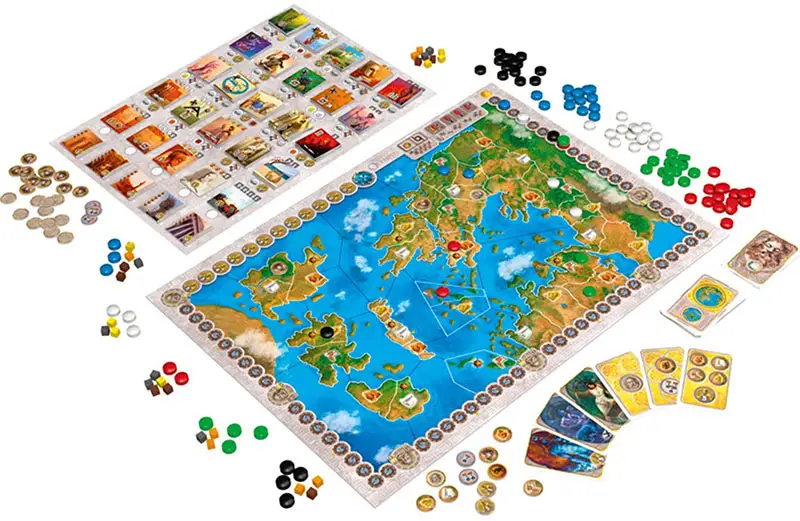
Object of the Game
The players represent tribes who are trying to colonize Greece and its surroundings, including the legendary Atlantis.
By taking over territories and resources (sometimes by force), they will acquire scientific discoveries and architectural marvels that will enable them to build a prosperous and glorious civilization.
At the end of the game, the most prestigious civilization wins.
Game Play
(4 players)
Turn order is determined by the position of the players on the Time Track, which runs round the edge of the board. The player who is last on the Time Track carries out an action, which will cost action points (see later).
Then the player "pays" for the action by moving his token along the Time Track. If this moves the token onto an already occupied space, it is placed on top of the other one. Now it is the turn of the player who is currently furthest back on the Time Track to take an action. And so on.
Notes:
It is perfectly possible for one player to have multiple turns in a row. This will occur if he is still in last place on the Time Track even after "paying" for his action.
If more than one player is on the same space (as, for ex- ample, at the beginning of the game) then the player whose token is on top of the stack plays first.
Hourglass Tokens
At certain points in the game, players will earn Hourglass tokens. These enable the player to carry out actions without having to advance on the Time Track (1 Hourglass equals 1 action point).
Any Hourglass tokens must be used up first to pay for actions before payment by advancing on the Time Track.
Example: Red is in last position on the Time Track. It is, therefore, her turn. She carries out an action that costs 3 action points. She has an Hourglass token in hand.
Therefore, she must spend the token first (1 point) and then moves her token forward 2 spaces to pay for the rest of the action. The red token is stacked on top of the green one. Since she is therefore still in last place on the Time Track, she plays again. Afterwards, it will be Green's turn...
Players have the choice between 2 actions on their turn: Expansion or Development.
A. Expansion
Expansion consists of moving one of his settlers on the mainboard. The aim of the movement is to conquer a new territory, either peacefully or through combat. The player can either move a settler already on the board, or place and move a new settler. The action is paid for at the end of the movement.
New settler: to create a new settler, the player must have at least one in his personal stock. The new settler can be placed either on the northern zone or on a territory already owned by the player. Creating a new settler costs 2 action points. The new settler must be moved immediately.
Notes: the northern zone is only used when placing new settlers. Settlers may not stay there, nor may they cross it during the game. The discovery of Medicine enables new settlers to be added at a cost of only 1 point.
Movement
A player may move a settler as many spaces as they like. It can cross territories that already contain a settler (including those belonging to another player) as well as empty ones. It may not stop in a territory that contains a Cross token, but is allowed to pass through it. The movement cost depends on the number of spaces entered:
- Entering a land space costs 1 action point;
- Entering a sea space costs 2 action points.
Note: the Horse-riding, Astronomy and Map-making discoveries reduce movement costs.
New Territory
A player who stops his movement on an empty territory automatically gains control of it. To show possession, take a Territory token correspond- ing to the resource produced by the territory.
If the player leaves the territory later in the game, the relevant token must be returned to the general stock. The Olympos territory provides a Zeus token to whoever controls it.
Combat
Aa player may also decide to end movement on a territory controlled by another player. In that case, they must fight. Combat is won automatically by the attacker, but the cost depends on the two players' military forces.
Military force is measured by the military discoveries that the two players have. Each such discovery has a number of Sword symbols on it. These determine the cost of combat:
If the attacker has more Sword symbols than the defender, the attack costs 1 action point;
If both players have the same number of Sword symbols (including zero), the attack costs 2 action points;
If the attacker has fewer Sword symbols than the defender, the attack costs 3 action points.
The attacker then places his token on top of the defen- der's token. The latter gives the attacker a Territory token corresponding to the resource produced by the territory (and a Zeus token, if the territory is Olympos) and receives an Hourglass token from the general stock.
The attacker now controls this area until either he is in turn at- tacked, or he leaves the territory, in which case control reverts to the player whose token is on top of the stack.
Note: a territory may be attacked even if other combats have already taken place there and there is therefore a stack of tokens in place as a result.
Flee
On his turn, a player whose token is underneath another player in the territory may freely leave the territory. He may also leave the token in place for as long as he wants.
The token that is moved may immediately return to initiate combat. However, the token must leave the area and then return: it cannot simply attack "in place". A player who has lost the control of a territory may not add new settlers there, even though he may still have a token in the stack.
Tribes
Territories marked with a star are strategic sites, occupied by tribes at the beginning of the game. Players must fight them in order to take control of the territory. Combat occurs as described above: the tribes do not possess any Swords.
Once the tribe has been defeated, the attacking player takes a Territory token corresponding to the resource produced by the territory as well as the Tribe marker, which he places Star side up in front of him.
If another player takes control of the territory, both the Territory token and the Star token are transferred to the attacker. If the player leaves the territory, the Star token is placed back in the territory.
If a player then (re)takes control of the territory, there is no combat (the tribe having been wiped out earlier): the "attacker" simply takes the Territory token and the Star token.
End of movement
at the end of his movement, the player adds up the points spent (new settler, movement, combat) and advances that number of spaces on the Time Track. This ends the player's turn.
Example: White has the Astronomy discovery, enabling him to cross sea spaces at the cost of 1 action point, and the Hoplite discovery, which gives him one Sword. He decides to attack Blue, who has no Swords.
White creates a new settler (cost: 2 points), crosses two sea spaces (cost: 1 point per space), enters Blue's territory (cost: 1 point for the land space) and attacks (cost: 1 point, because White has more Swords).
Blue is conquered and therefore gives White a Wood Territory token and a Star token (as shown on the conquered territory). As compensation for the attack, Blue receives an Hourglass token. White pays for the move by advancing his token 6 spaces on the Time Track. His turn is now over.
B. Development
Development consists of either making a discovery or building a wonder.
-
Discovery
To make a discovery, the player must have both the Territory tokens and/or the resource cubes required to pay for it. Territory tokens correspond to resources that the player has permanently available. The tokens are not used up when paying for a discovery. Resource cubes correspond to a single resource. When they are used to pay for a discovery, they must be returned to the general stock.
Note: certain discoveries do not require a specific resource, but they do require a specific combination of resources.
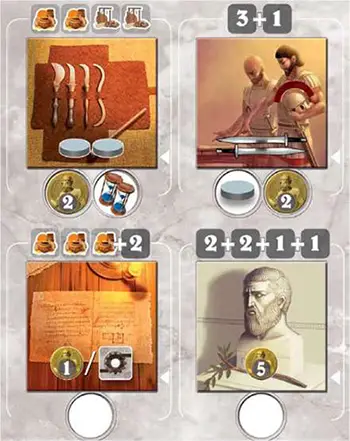
Example:
To develop Surgery (top/left), the player must pay 2 Grain and 2 Wood.
To develop Science (bottom/left), the player must pay 3 Grain and any 2 identical other resources (not Grain), such as 2 Gold.
To develop Strategy (top/right), the player must pay 3 identical resources and 1 other different resource (for example, 3 Gold and 1 Wood).
To develop Philosophy (bottom/right), the player must pay two pairs of resources and two other resources, all different. For example, 2 Grain, 2 Wood, 1 Gold and 1 Stone.
The resources used are either Territory tokens or resource cubes or both. For example, a player could pay for Surgery with 2 Grain Territory tokens and a Wood Territory token (all of which he keeps) and a Wood cube (which is returned to the general stock).
Acquisition
If a player can pay for a discovery using a combination of Territory tokens and/or resource cubes, then he simply takes the Discovery tile concerned and places it in front of him. He is now allowed to use the tile's special power (see last page).
Note: a player can only make a given discovery once. It is therefore impossible to discover Agriculture twice, for example.
Bonus
The player then takes one of his color's tokens from the general stock and places it on any available space below the discovery he has just acquired on the development board.
However, if the discovery allows 3 bonus options (red and green backed discoveries), the player may not take the grey bonus as that is reserved for the 5-player game.
The player immediately takes the bonus and adds it to his personal stock. This bonus is no longer available for other players who make the same discovery.
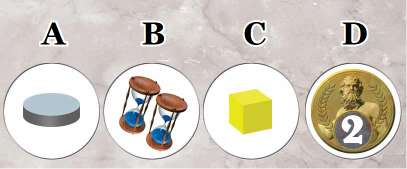
Bonus:
-
the player takes one of his tokens from the general stock and adds it to his personal stock. It can be added to the game board on a subsequent turn.
-
the player takes 2 Hourglasses.
-
the player takes 1 Gold resource cube.
-
the player takes 2 Prestige points which he places face down in front of him.
Note: discoveries on the fifth row do not provide any bonuses.
Cost
7 action points. The player therefore moves his token 7 spaces along the Time Track. This ends his turn.
Note: the Money and Agriculture discoveries reduce this cost.
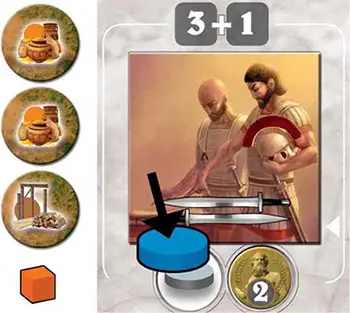
Example: Blue decides to develop Strategy (3 identical resources and 1 different). Blue has Grain, Grain and Wood Territory tokens as well as a Grain cube. He can, therefore, acquire Strategy by discarding the cube.
Blue takes the Strategy tile and adds it to his personal stock: he now has 2 Swords for use in combat. He must now select a bonus. To mark his choice, he takes one of his tokens from the general stock and puts it on the bonus.
He decides to take a new settler and therefore puts his token on that bonus, and then takes one of his settlers from the general stock and adds it to his personal stock. He now has a new settler that he can play onto the mainboard in a later turn.
Blue must now pay for his action. He therefore advances his token 7 spaces on the Time Track. This ends his turn.
-
Wonders
Each Wonder costs the number of Stars shown. To build a Wonder, the player must have the correct number of Star symbols. Players acquire a star:
- For each Star token in front of them;
- If they own the Architecture or Engineering discove- ries;
- For each bonus token in the same column as the Wonder concerned;
- For certain cards.
The player then takes the Wonder tile and places it in front of him. This Wonder will earn him victory points at the end of the game.
Cost
7 action points. The player therefore advances his token 7 spaces on the Time Track. This ends his turn.
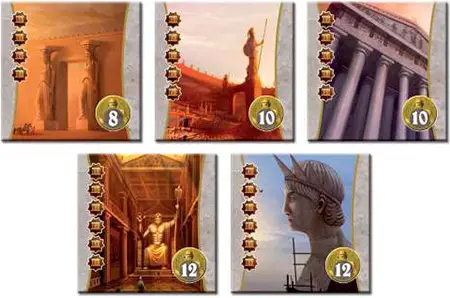
Wonders: the Lion Gate, the Stadium, the Parthenon,
the Statue of Zeus and the Colossus,
Destiny Cards
During the game, the players will draw Destiny cards. These provide various bonuses.
Draw a card: whenever a player reaches or passes a Zeus space on the Time Track, he draws a Destiny card at the end of his turn. The card can be played immediately.
Play a card: players may play as many cards as they wish during their turn. The effects are applied immediately. If a card provides prestige points, they are placed face down in front of the player earning them.
Note: the Oracle discovery enables the player who owns it to improve the Destiny card deck.
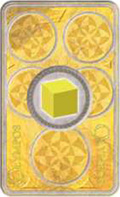
The player gains 1 resource cube of the color shown.
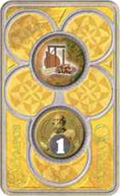
The player earns 1 point for each Wood Territory token he owns.
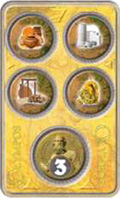
If the player has a Territory token of each type, he earns 3 points.
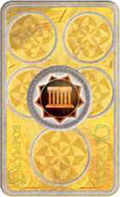
The player can discard this card in order to help build a Wonder. It is worth 1 Star.
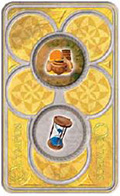
The player earns 1 Hourglass for each Grain Territory token he owns.
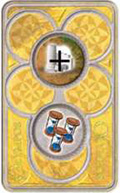
The player earns 3 Hourglass tokens if he has more Stone Territory tokens than each of the other players individually.
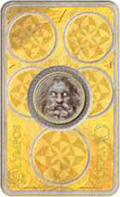
To be played after an Olympos card is drawn. The player adds a Zue token to his total then discards the card.
Olympos Cards
During the game, 9 gods will turn up to interrupt the players' actions. These events are triggered when certain players reach specific spaces on the Time Track, marked with a Zeus symbol:
-
For the first two and the last Zeus space on the Time Track, an Olympos card is drawn at the end of the turn of the first player to reach the space (and after the Destiny card has been drawn). The effects of this card are therefore applied before the next player starts their turn.
-
For the three Double Zeus spaces, an Olympos card is drawn at the end of the turn of the first player to reach the space. A further Olympos card is drawn at the end of the turn of the last player to reach the space. In both cases, the effects of the card are applied before the next player starts their turn.
Effect
Half of the cards have a beneficial effect and half have a detrimental effect. However, these events won't necessarily affect all the players. To see who is affected by a given card, the players add up all the Zeus symbols they have (whether on discoveries, on Zeus tokens, or on Destiny cards that they play after the Olympos card is revealed):
If the effect is beneficial, it is applied to the player(s) with the most Zeus symbols (at least one Zeus symbol) when the card is drawn.
If the effect is detrimental, it is applied to the player(s) with the fewest Zeus symbols (or none at all).
The Artemis and Hades cards are applied in a clockwise direction, starting with the player who drew the card.
Advice: in order to show which players are affected by certain gods (Athena, Ares, Keres, Siren and Erinyes), the players concerned should place one of their tokens from the general reserve on the card.
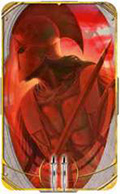
Ares
The player with the most Zeus symbols earns 2 Swords. These Swords remain active until the next Olympos card is drawn.
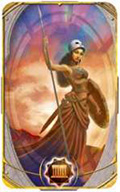
Athena
The player with the most Zeus symbols earns 1 Star. This Star can only be used to help build a Wonder, after which it is discarded.
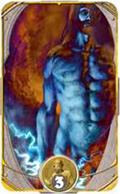
Zeus
The player with the most Zeus symbols earns 3 points, which he places face down in front of him.
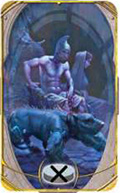
Hades
The player with the fewest Zeus symbols loses 1 settler of his choice from the board. The settler is returned to the player's personal stock.
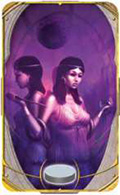
Hecate
The player with the most Zeus symbols takes 1 settler from the general stock and adds it to his personal stock.
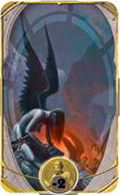
Keres
The player with the fewest Zeus symbols loses 2 prestige points at the end of the game.
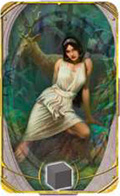
Artemis
The player with the most Zeus symbols earns a resource cube of his choice.
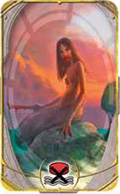
Siren
The player with the fewest Zeus symbols may not enter any sea space until the next Olym- pos card is drawn.
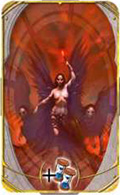
Erinyes
The next action of the player with the fewest Zeus symbols costs 2 points more.
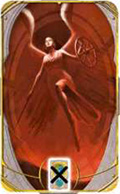
Nemesis
The player with the fewest Zeus symbols discards all their Destiny cards.
End of the Game
When a player has passed the last Zeus space on the Time Track and it is his turn again, he has the option of passing or taking a final turn. If he passes, that ends his game.
If he takes a final turn, he undertakes one last action but this must not result in him going past the Cross space. When all the players have finished, the points are added up.
Note: the remaining players continue playing until they have each reached or passed the last Zeus space on the Time Track and taken their optional final action.
Distribution of prestige points: the Time Track is now used to show the players' scores. The track is marked every 5 spaces in order to help with the scoring.
Add up the players' prestige:
-
The player's final position on the Time Track earns between 0 and 5 points.
-
Each Prestige token earns the player the value shown.
-
Territories :
- Each "normal" territory is worth 1 point (a conquered settler does not earn any points).
- Each Atlantis territory is worth 2 points (a conquered settler does not earn any points).
-
Each discovery tile is worth 2 points.
-
Each Wonder is worth between 8 and 12 points. The Poetry and Philosophy discoveries are worth 3 and 5 points respectively.
-
The Absolutism, City, Science and Engineering discoveries provide bonus points (see later).
-
Deduct 2 points from each player affected by the Keres Olympos card.
-
Each Destiny card in a player's hand is worth 1 point.
Note: resource cubes and Hourglass tokens do not provide any points.
The player with the most Prestige points wins the game.
In the event of a tie, the player with the most discovery and Wonder tiles wins.
Continue Reading
